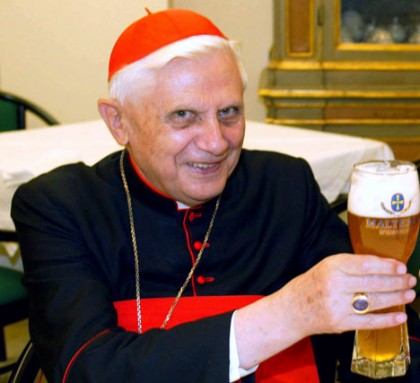I believe the decline in numbers of priestly ordinations over the last fifty years is due in part to blurring the distinction between the ordained priesthood and the priesthood of all believers. To put it another way, we Catholics have been clericalizing the laity and laicizing the clergy. Anything and everything done in the Church today is now called a ministry. My personal favorite - I am not making this up - is calling the janitors "ministers of sanitation." If everything is now a ministry, then the danger is that people will start to think of the priesthood as just one among many - ordained ministry. Don't misunderstand; lay employees and volunteers honorably serve the Church and God's people. Within the three major states of life - lay, priestly, religious - we may have a call within a call. A vowed religious may be called to the priesthood, but his primary vocation is that of a religious. A diocesan priest's primary vocation is to serve God's people in the parishes where he is appointed, but he may also be a seminary professor or a writer or speaker like Fr. Robert Barron. Likewise, some lay people may have a calling to serve the Church in a certain way be it as a catechist or a youth minister or an apologist.
But what is the lay vocation, properly speaking? Does it even make sense to speak of the lay state as a vocation considering it is the "default" into which all of us are born? Indeed it does. Religious orders are, by definition, apart from the world even if their charism involves active apostolates. They live in community and pray together. Parish priests can be active in the world but they are nonetheless tied to their parish and their diocese barring any release from their bishop. The responsibilities of the parish priest include a promise to recite the Divine Office every day which is usually an abbreviated form the Office that religious pray. Lay people live and work in the world. To use a martial metaphor, if the Church is God's army on earth then the laity are the enlisted soldiers. We are the tip of the sword, so to speak. Speaking of the human side of the Church, it is only through the prayers and contributions of the laity, either through time or treasure, that the Church is able to accomplish much of her charitable work.
As St. Paul tells us, the Body of Christ has many different members. Each part has a purpose. What would happen to the body if the eyes said "I don't want to see but to hear?" or the feet said "I want to be the eyes and see?" Earlier I mentioned the problem of clericalizing the laity. It is a good and laudable thing for lay people to directly assist the Church through taking jobs as secretaries, catechists, and such. Father can only hire so many people or handle so many volunteers. Our primary mission as lay people is to bring the Gospel into the workplace and the culture.
What does that mean? It doesn't necessarily mean you hang out in the break room on your ten and argue over the finer points of theology with your Protestant coworkers (although if you have the aptitude and desire to do so and they're willing to listen, go for it.) I strongly urge all Catholics to review and study their faith enough to be confident about the basics. Speaking from my own experience as a former heathen interested in joining the Church all those years ago, it was, no offense, like pulling teeth to get you people to evangelize me.
"Is it true you guys worship Mary?"
"Uh, I don't think so..."
"So why do you pray to her then?"
"Uh... uh... I dunno..."
Let me give you an example of how I've put the New Evangelization to action. This may scandalize you though. I've noticed that here in the United States almost everyone is a Puritan, even the Catholics, even the atheists. Where is it that young people congregate in large numbers? The bars, the pubs, the taverns. If I had a nickel for every patron who has said to me, "Wait, you can smoke and drink as a Catholic?" I could buy myself a fancy steak dinner. But how do you broach the subject of the Catholic faith to complete strangers who may or may not be in a drunken stupor?

The Church has a hierarchy of feast days and Holy Days. I often said to my friends, "Come! We must drink and celebrate for today is the feast of St. Cunegunda!" or whoever.
"Huh? Who's that?"
"Oh, you've never heard the tale of this outstanding saint? Let me tell you the story. We must head back through the mists of time to the 13th century, the greatest century..."
I love history and telling stories. I like to think it was through my love of history that God planted the idea of becoming Catholic in my heart. As John Henry Newman said, to be immersed in history is to cease to be Protestant. But not everyone has my gifts, and other people have gifts that I don't have. Ask yourself what you like to do, and then ask how you can use that for the good of souls. In some ways, lay people have more freedom than priests and religious. Lay people can move and work and evangelize in the world as they see fit (likewise, that immersion in the world carries with it more dangers than faced by priests and religious.) Make the most of it.
